The ‘cardiac cough’ could be a symptom of heart failure, so here’s how to tell if your wheezy cough is something to be concerned about.
According to the NHS, congestive heart failure, known nowadays as heart failure, is when the heart no longer pump blood around the body properly.
The health issue doesn’t necessarily mean that your heart has stopped working – but it does mean that it may need professional support to get it working more effectively.
It’s a long-term condition that usually gets worse over time, which is also more common in older people.
One of heart failure’s symptoms is a nasty ‘cardiac cough’, but what distinguishes it from a regular cough?

A chesty, wheezing cough might be a sign of heart failure (Getty Stock Photo)
What is a ‘cardiac cough’?
According to experts at Medical News Today, it can be defined as coughing that occurs as a result of heart issues, rather than lung conditions.
When heart failure occurs, the heart can’t pump enough blood around the body, resulting in fluid retention, as it builds up in the air sacs in the lungs – which can make it sound ‘wet’.
Professionals call this lung congestion, or pulmonary edema. As your body tries to clear the lungs, you cough.
Factors such as diet and the seriousness of your heart failure can contribute to the development of the fluid and heart failure medication could be causing side effects too, as healthcare professionals usually prescribe angiotensin-converting enzyme inhibitors (ACE inhibitors) to treat the condition, despite it potentially causing a chronic cough.
The sound of wheezing and struggle to breath may become more evident at night while lying down to sleep, according to Nora Eccles Harrison Cardiovascular Research and Training Institute.

There are a number of other symptoms to look out for, which could signal heart failure (Getty Stock Photo)
What are some of the symptoms to look out for?
The American Heart Association list these symptoms to look out for, as well as coughing:
- Shortness of breath
- Fluid build up in the body
- Swelling in the legs
- Persistent fatigue that hinders daily activities
- Intolerance to exercise
- Loss of appetite
- Nausea
- Increased heart rate
- Confusion
How do you treat a ‘cardiac cough’?
You can be prescribed diuretics by a doctor, which reduces fluid retention in your body, and alleviates coughing.
Medication can also be prescribed that improves heart function, reducing heart rate and improving blood pressure to help the heart beat more regularly and efficiently.
Lifestyle changes can also play a role in treating the condition, as doctors can ask patients to limit and track their daily liquid intake, as well as the following:
- Reducing salt intake
- Limiting caffeine
- Giving up smoking
- Cutting down on alcohol consumption
- Regular exercise

More exercise can help alleviate the condition (Getty Stock Photo)
When to contact a doctor
If you have any symptoms of heart failure, you should call your GP – people with the condition need a treatment plan to decrease symptoms and slow down its development.
You should contact a healthcare professional if you:
- Notice swelling in the ankles, feet or legs
- Cough up blood or pink mucus
- Gain more than 1.36 kg (3 lbs) in 24 hours – a sign of fluid retention
- Have an increased shortness of breath or intolerance to exercise.
You may need to seek emergency treatment if symptoms are worse though, as a hear-related cough can have similar symptoms to some lung diseases.
Look for emergency treatment if you experience:
- Blush skin
- Confusion
- Chest Pain
- Extreme shortness of breath
Featured Image Credit: Getty Stock Photos

A doctor has urged people to be aware of the symptoms of heart failure which are often overlooked, especially the one you could notice while in bed.
The deadly condition is becoming increasingly common in the UK and an estimated 920,000 people are living with it, while a whopping 200,000 new cases are recorded each year.
According to the NHS, symptoms can develop rapidly or over weeks and months – but either way, a speedy diagnosis is key.
What exactly is heart failure?
For those who don’t know, heart failure occurs when the main organ of your cardiovascular system is unable to pump blood around the body properly. In most cases, it happens as a result of the heart becoming too weak or stiff, meaning it needs some support.
The long-term condition, which typically becomes worse over time, can severely limit the abilities of the sufferer and is ‘often eventually fatal’, the NHS warn.
That’s why spotting the signs as early as possible is extremely important – as although there is no cure, the right treatment can help someone manage their symptoms for several years.
This is on top of the fact that heart failure can lead to serious complications such as blood clots, an arrhythmia, organ damage and cardiac arrest, so being aware of the red flags can buy you some very valuable time.

It’s important to know the signs of heart failure (Getty Stock Image)
The signs and symptoms of heart failure
According to Dr Rosie Godeseth, people with heart failure report experiencing varied symptoms, but there are some which continuously crop up in patients.
The medic noted that a lot of people pick up on one common symptom while they are in bed, however it is easily missed – so make sure you are paying attention when you’re head hits the pillow.
Speaking to The Sun, the cardiologist and Associate Medical Director at Vitality Health explained: “Sometimes people will experience fluid buildup in the lungs which can make it hard to breathe when lying down.
“If you find yourself having to be propped up on pillows while you sleep or are waking up short of breath, then book an appointment to see a doctor who may recommend undergoing a sleep study or heart function tests.”
So, if you are struggling to aspirate when lay flat and find yourself propping yourself up with more pillows, it might mean that you need to book an appointment with your GP.

If you struggle to breathe when lying flat, you should book an appointment with your GP (Getty Stock Image)
Look out for swollen ankles and legs
As well as this, you need to be aware that swollen ankles and legs – or possibly even thighs, groin or abdomen – might be a sign of heart failure.
As your heart is struggling to pump the blood around your body effectively, this can cause a build-up of fluid which is known as oedema.
“It’s important to speak to a doctor if swelling persists or is accompanied by other symptoms like dizziness and shortness of breath,” Dr Godeseth said.
A persistent cough, wheezing and a ‘bubbling’ feeling in the chest can also be a sign of heart failure.
This symptom has been dubbed a ‘cardiac cough’ and often occurs due to a fluid buildup in the lungs, according to the health expert.
The doctor continued: “It’s important to speak to a doctor if you have had a cough for more than three weeks, especially if any mucus produced is pink or blood-tinged.”
Rapid weight gain can also be a symptom of heart failure, as the body retains extra fluid and salt when the heart isn’t pumping blood properly.
Dr Godeseth went on: “When the heart isn’t effectively pumping, it can lead to reduced blood flow in the kidneys. These organs regulate fluid and sodium balance, so they respond to the reduced blood flow by retaining fluid and sodium. This fluid accumulates in the body’s tissues, particularly the lower limbs, abdomen and sometimes even the lungs.”

Fluid retention, known as oedema, is also a common symptom of heart failure (NHS)
Lifestyle changes are key in avoiding heart failure early on
She reckons that as heart failure typically affects the older generation, a lot of Brits don’t believe they need to worry about it – but according to Dr Godeseth, people are best off making some big lifestyle changes now to see the benefit later down the line.
The medic explained that consuming a healthy balanced diet, taking part in physical activity regularly and ditching tobacco can all decrease your risk of heart failure.
She added: “It’s really important not to assume heart health is something that should only be considered, or focused on, once you’re older as the actions we make today go a huge way in preventing illness in the future.
“In fact, 80 percent of heart disease cases and strokes are preventable.”
Featured Image Credit: Getty Stock Images
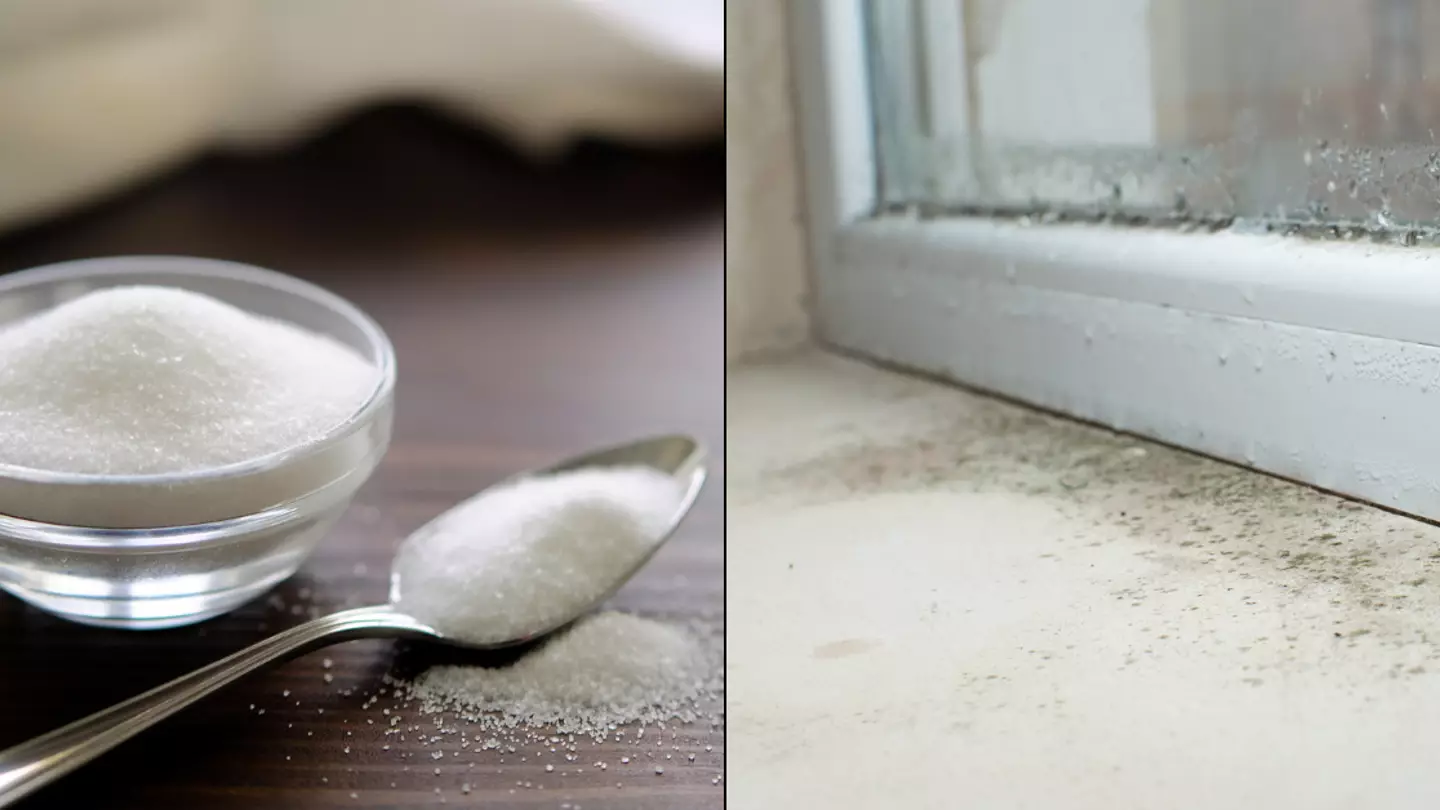
As autumn draws in and the heat of summer becomes a distant memory beneath the bleakness of cold skies, there’s a few things you need to watch out for.
You’ll need to be ready for the clocks to go back this weekend, and to get ready for your commutes to and from the office to be shrouded in darkness.
Within the confines of your own home you’ll also need to look out for some potential dangers to your health and figure out some ways to tackle them.
Among the things to deal with is a ‘silent killer’ which can hamper your health and creep into your home as time goes by.

It’s a bowl of salt, so how can that help on the windowsill? (Getty Stock Photo)
What’s this ‘silent killer’?
I’m glad you asked, dear reader.
It’s mould, that quiet, fuzzy and utterly unwanted home decoration which can creep into certain abodes at a particular time of year and start impacting things.
More specifically, it can start impacting you as it can kick off respiratory illnesses, set off allergies if you have them and make life harder in general for asthmatics.
In serious cases it can even kill you, though it’s more likely to just make your life unpleasant by getting into your home and chipping away at your health.
If you want to keep this ‘silent killer’ away then you’ll need to avoid your home becoming damp, and that means you’ll want to crack down on condensation.
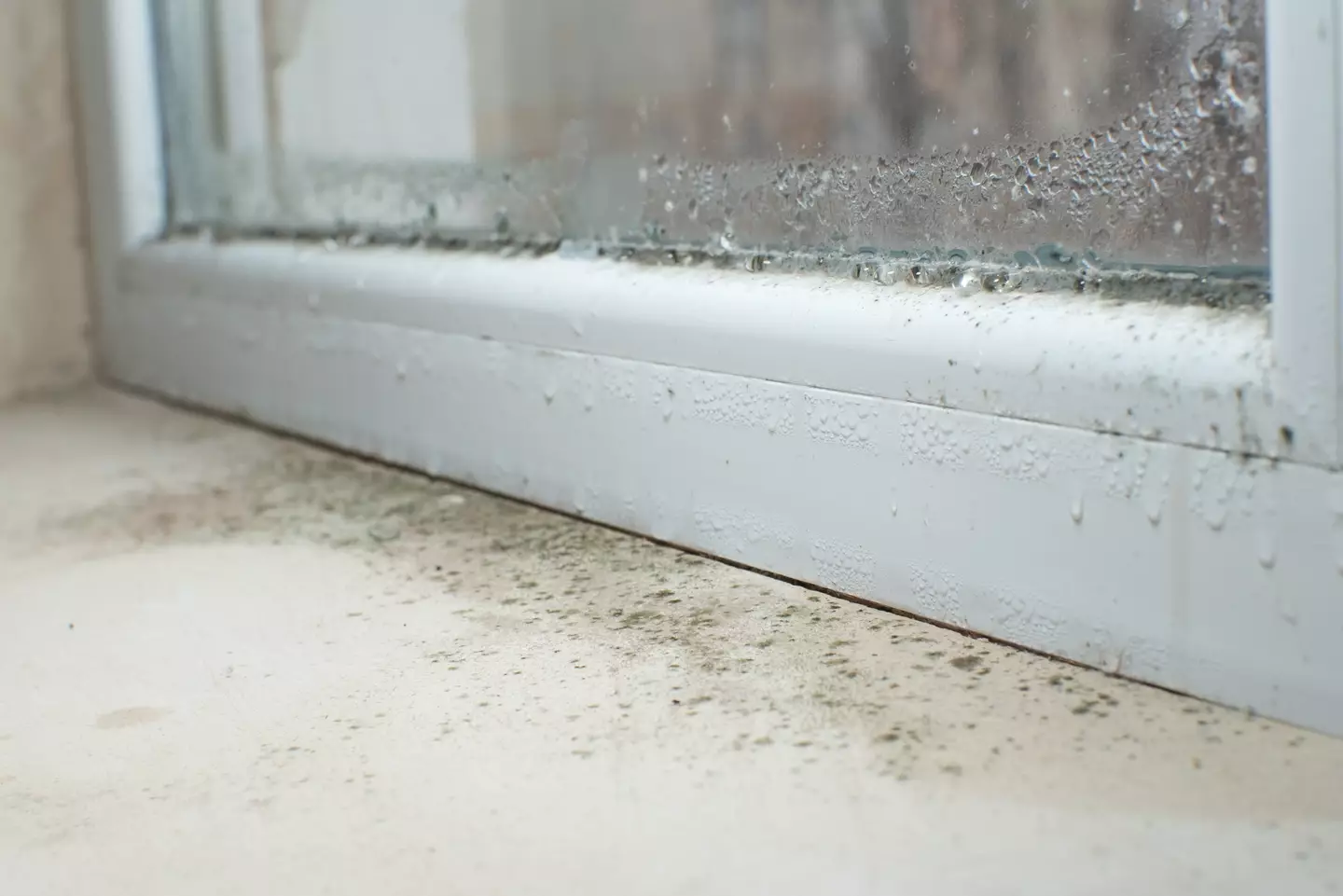
Condensation can lead to dampness and mould. (Getty Stock Photo)
What causes condensation?
Another good question, you’ll get condensation when the temperature on one side of a pane of glass is colder than it is on the other.
Given that it’s autumn you’d definitely hope that’d be the case inside your home, given that we’re getting to the time of year where you really have to start thinking about sticking the heating on.
The warm air hits the cold surface and cools down, releasing the moisture it contained which turns into droplets of liquid.
That liquid can then run down and make things damp, causing conditions for mould to creep in.
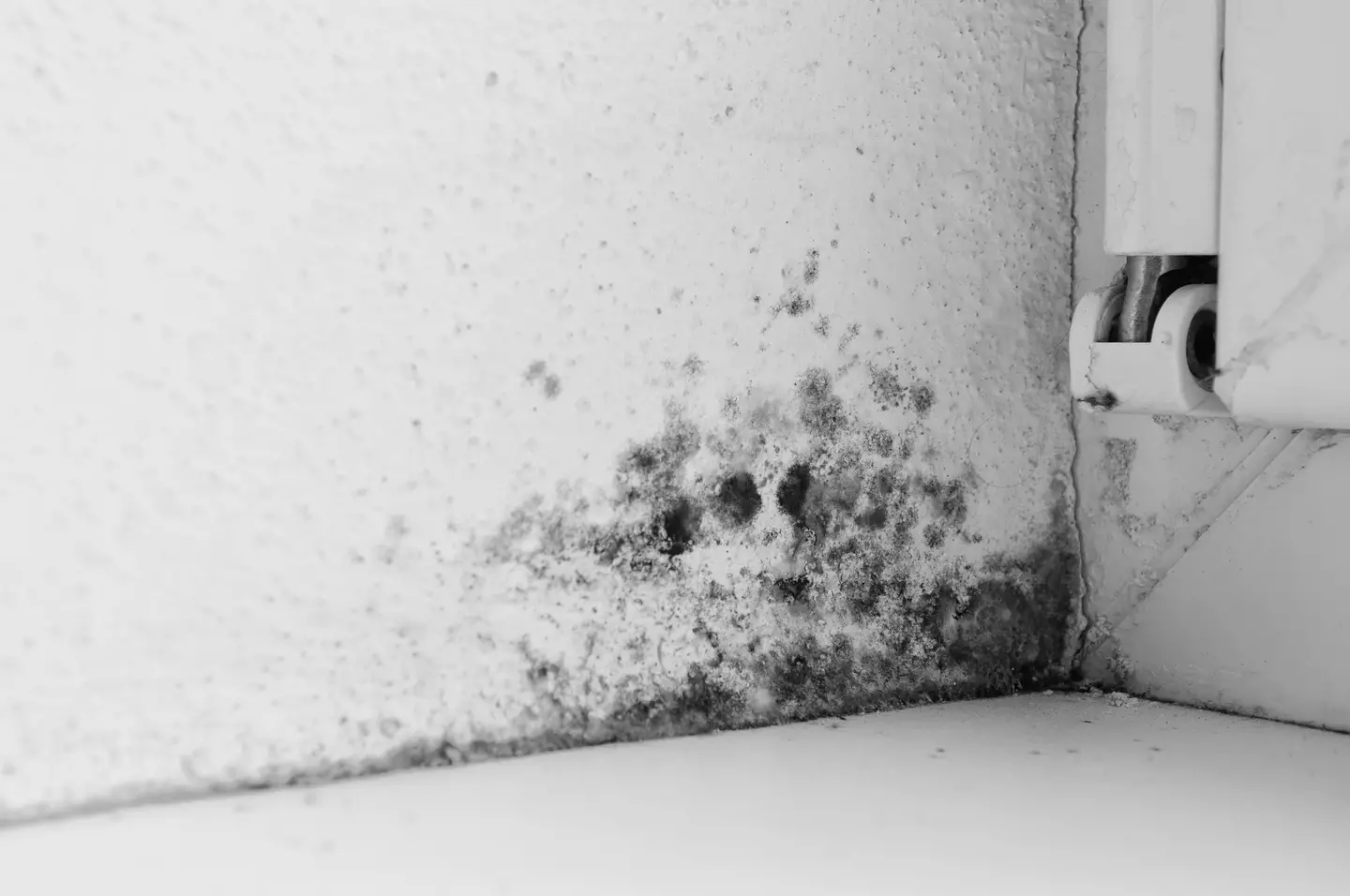
Mould is really bad for your health, so you definitely don’t want it inside your home. (Getty Stock Photo)
How can a bowl of salt help with condensation?
There used to be a superstition that drawing a line of salt across something would help ward evil spirits away.
It’s not quite the same as using salt to tackle mould but it’s close enough.
According to Posh.co.uk, salt absorbs moisture from the air which means there’s going to be less to form on the window and thus cause damp, which can lead to mould.
One of their experts said: “It’s a really easy trick that requires no effort at all. Simply fill a shallow bowl or a small jar with some salt – this can be table salt or rock salt.”
The bigger the window, the bigger the bowl of salt you’ll need to use for it to be effective, but we’re still talking small quantities here.
You will have to periodically replace the salt after it has absorbed enough moisture, and you’ll know this is the case after your bowl gets damn and the salt starts to ‘clump together’.
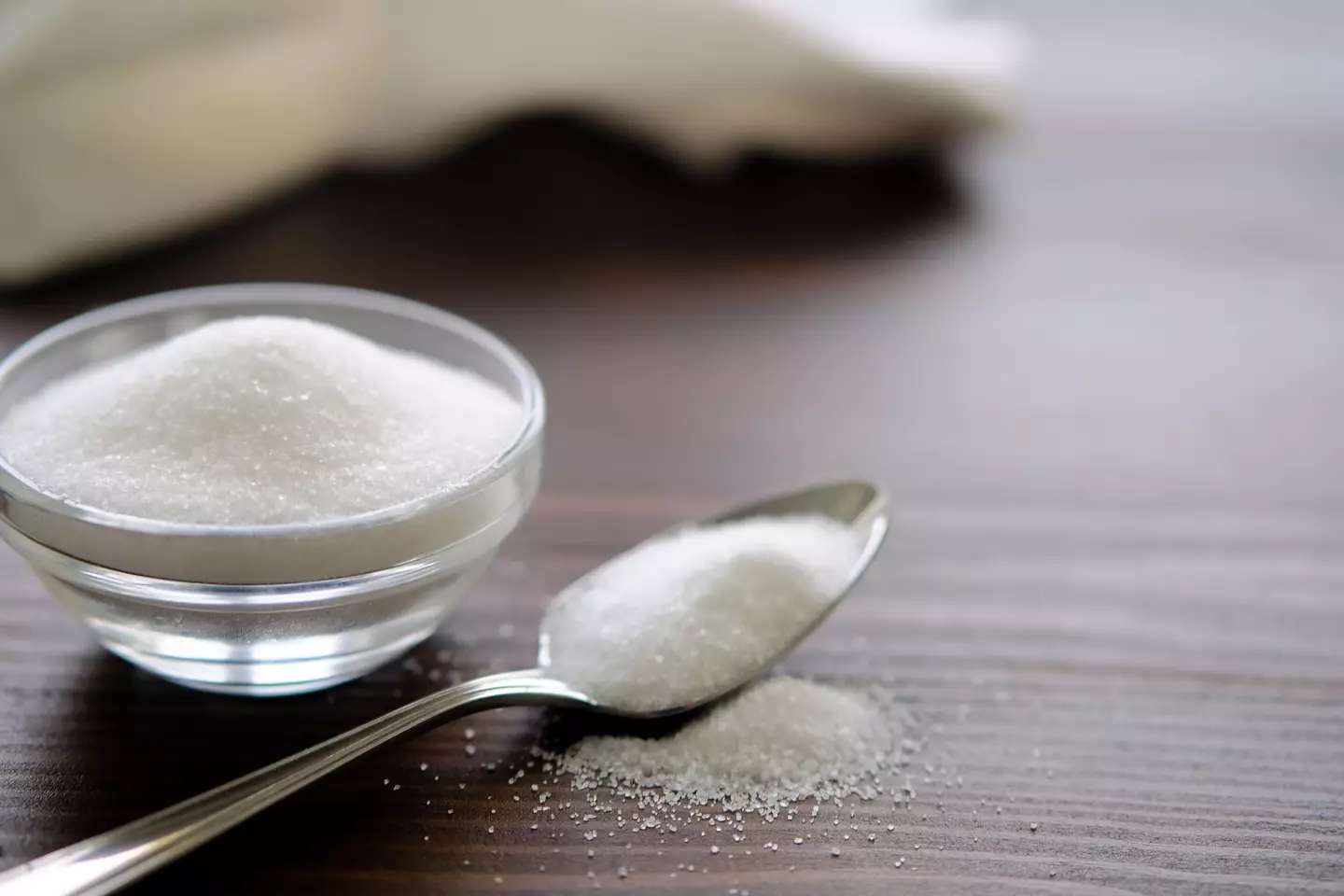
Remember to change the salt when it gets too damp. (Getty Stock Photo)
What else can I do to get rid of condensation?
Experts from Household Quotes have come up with some other advice you could try.
Their expert Joshua said you could try opening your windows for a couple of hours a day to let the moist air out and replace it with fresh stuff.
Keeping your home warm enough can also help stop condensation from forming in the first place, so Joshua recommended opening your windows for a bit in the morning and then putting the heating on once you’d closed them again.
He also suggested using a dehumidifier and avoiding doing things that added moisture to the air like drying clothes indoors or boiling water without lids on pots.
If your bathroom has an extractor fan that’s recommended to have on for half an hour after you use the shower as well, since it’s probably going to be the dampest room in your house.
Featured Image Credit: Getty Stock Images

Convenience tends to be a high priority for many of us after the long commute back home from work.
By the time you get home, often the last thing you want to do is spend an hour or two whipping up a meal. You want something quick and easy that lets you enjoy the night off before you’ve got to do it all again.
However, it seems that a common, budget-friendly choice could be ‘a colossal risk to public health‘.

Most of us have it knocking around in the cupboards (Getty Stock Images)
We’ve been having tinned food for years, but a new study has suggested that it could be doing more harm than good.
150 tins of tuna were purchased across the UK, France, Italy, Spain, and Germany, with tests showing that all of them ‘were contaminated with mercury’.
Exposure to mercury could cause health problems, such as nervous system effects like vision, hearing, and speech disturbances.
More seriously, the metal has been linked with life-threatening lung damage and even some cancers.
The US Environmental Protection Agency said: “In very high doses, some forms of mercury have caused increases in several types of tumours in rats and mice.”
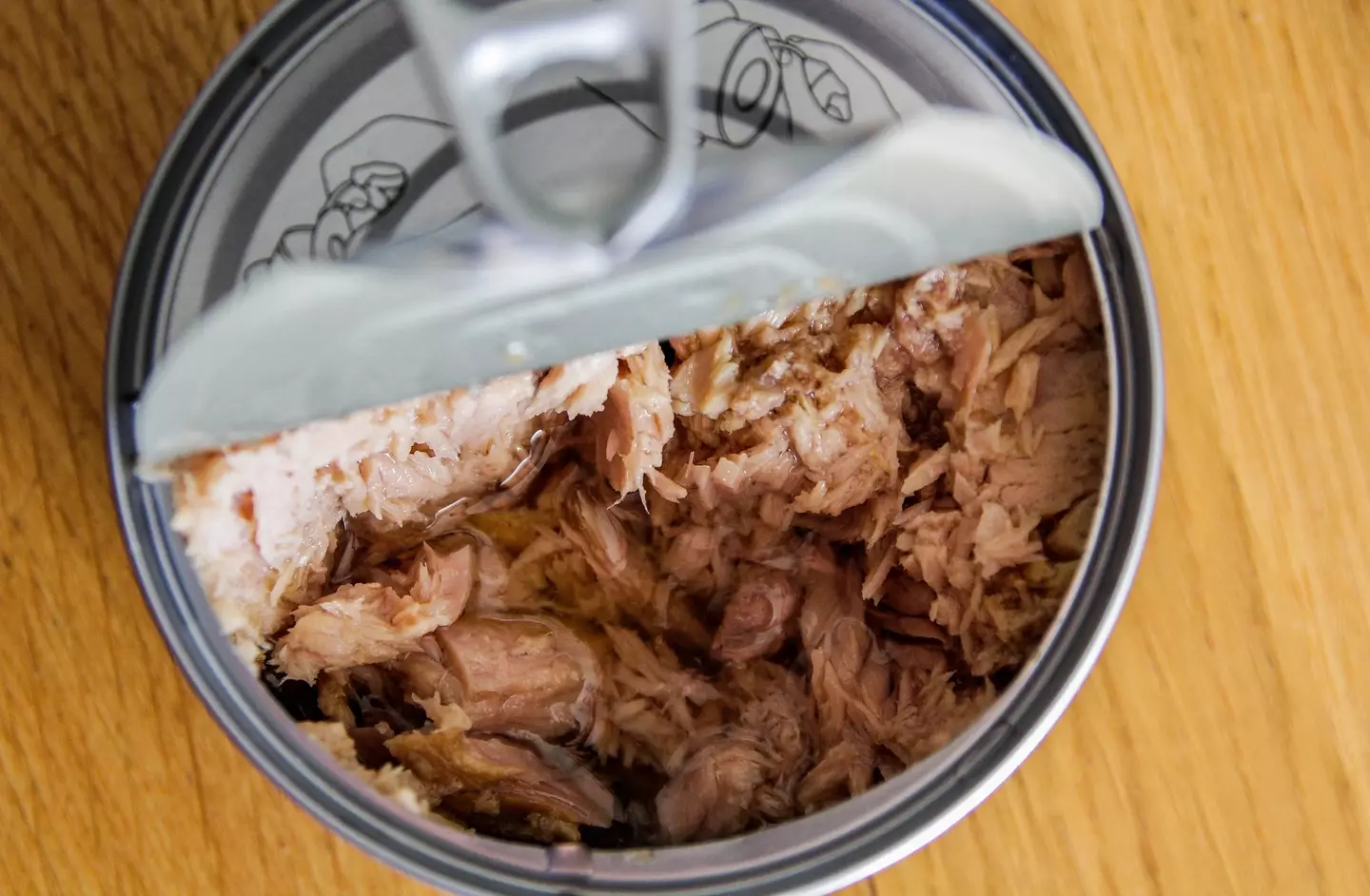
Tinned tuna is packed with protein and convenience, but it might also lead to serious health issues (Getty Stock Images)
Though they note that ‘no human data currently tie mercury exposure to cancer, but the data available are limited’.
Karine Jacquemart, CEO of consumer rights organisation Foodwatch France – one of the two groups behind the study – said: “What we end up with on our dinner plates is a colossal risk to public health that’s not considered seriously.
“We won’t give up until we have a more protective European standard.”
The Bloom group, which campaigns for protection of the oceans, also added: “That is the reason why tuna, among the most contaminated species, is given maximum tolerance in mercury three times higher than less contaminated species.
“Mercury is not less toxic if it’s ingested through tuna, only the concentration of mercury counts.

We’ve all seen tuna sandwiches going in the meal deal section (Getty Stock Images)
“We demand that the public authorities strengthen regulation and, without delay, that distributors do not sell products over the most protective level.”
They noted that in more than half of the tins, the mercury level was higher than the 0.3 milligrams per kilogramme maximum limit for mercury in other fish.
Bloom claim that the accepted mercury level of one milligram per kilo is there to make sure that ’95 percent’ of tuna caught is sold.
Mercury exposure can also come from breathing in mercury vapour and skin contact, causing skin itching and redness.
Featured Image Credit: Getty Stock Images
Topics: Food And Drink, UK News, Health, Science, Environment
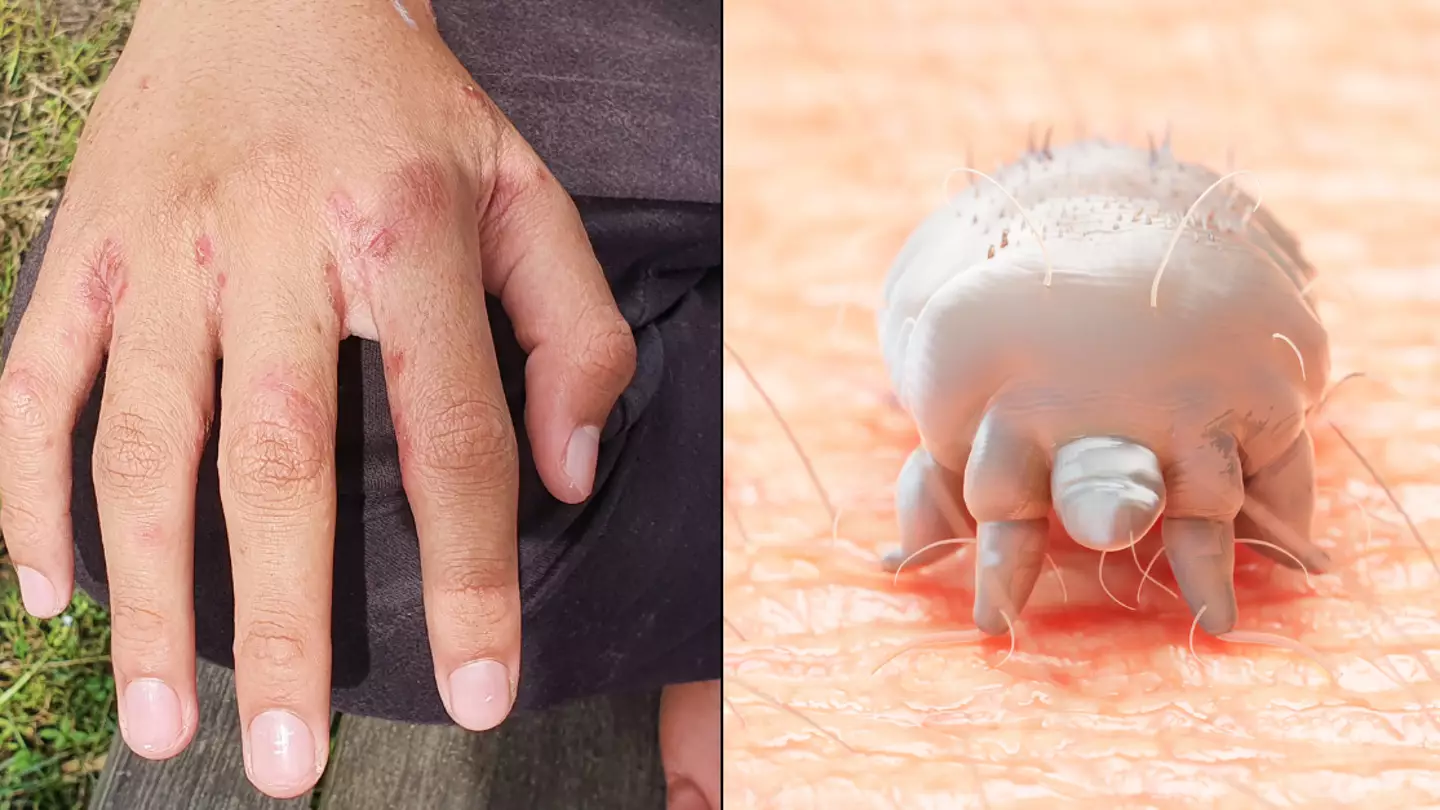
Brits have been warned to be wary if they spot any ‘tiny red dots’ on their skin amid a spike in scabies cases in the UK.
Doctors are urging people not to ignore the symptoms of the highly infectious condition, which the NHS says ‘anyone can get’ – however, there are some people who are even more at risk than others.
Professor Kamila Hawthorne, the chairwoman of the Royal College of GPs, explained that scores of cases are being recorded and diagnoses are ‘above the five-year average and rising’, especially in the north of England.
“While not a serious condition, scabies can be very itchy and irritating,” she said. “If not properly treated, it can spread and increase a patient’s risk of complications, such as secondary skin infections or make existing skin conditions worse.”
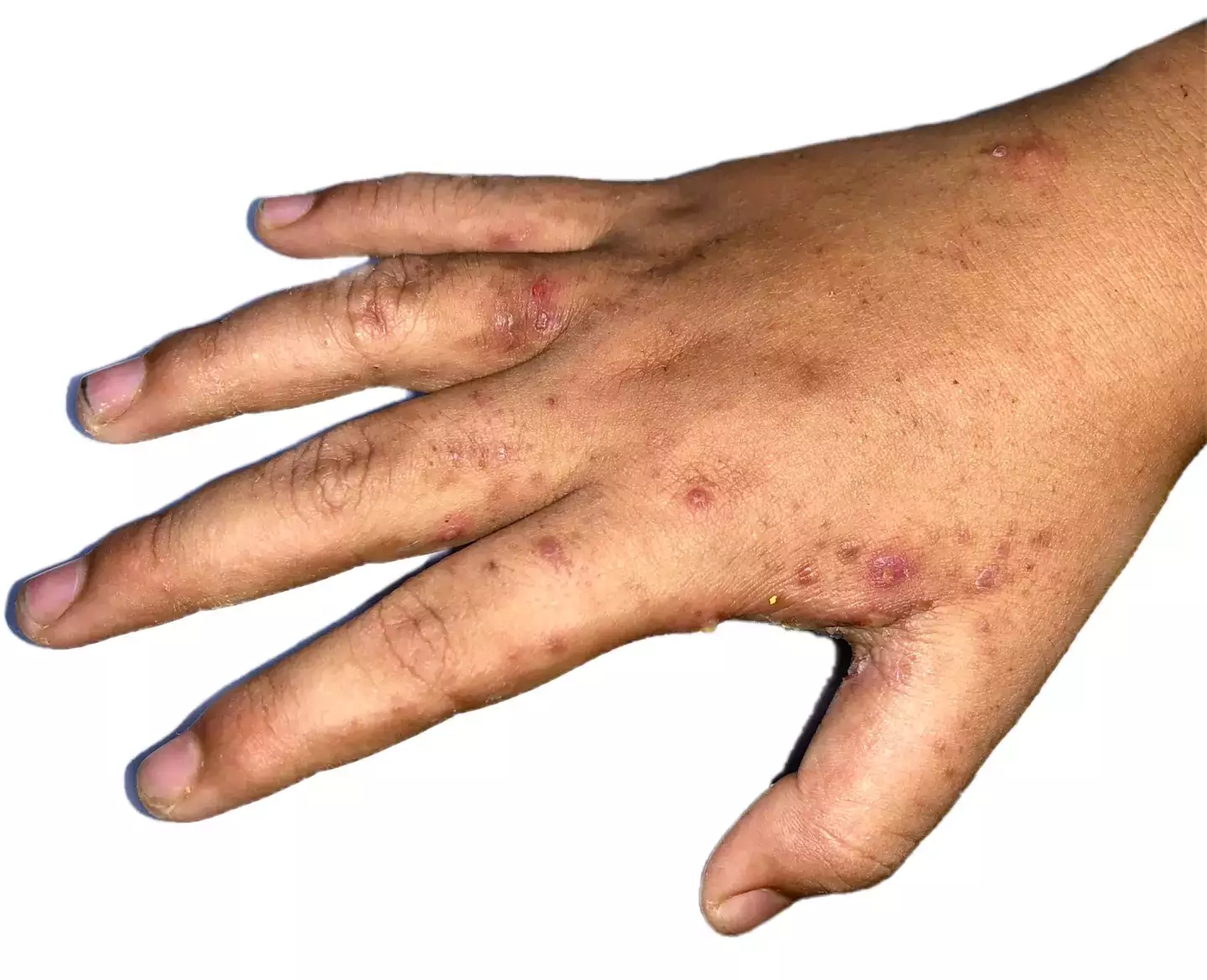
Doctors have urged Brits to seek help if they spot ‘tiny red dots’ on their skin (Getty Stock Image)
What are scabies?
For those who don’t know, scabies is an infectious disease caused by mites burrowing under your skin – causing an extremely itchy rash which can spread across your entire body.
According to the NHS, you should look out for a raised rash or spots which may appear to be red, while you may also experience intense itching, especially at night.
One university student told the BBC that he had started to get ‘tiny red dots’ around his wrists and hands – and if you spot the same thing on your skin, then you need to take action.
Professor Hawthorne told people not to be put off from seeking treatment due to the ‘social stigma’ surrounding scabies, as brushing off the symptoms could lead to the condition ‘getting worse’ while also putting other people in the firing line for contracting it too.
Although it is not typically a cause for serious concern, it still needs to be dealt with and as we mentioned, all of us need to be on guard – but there are a few certain people who need to be even more vigilant.

Scabies, which results in a very itchy rash, is caused by mites burrowing under your skin (Getty Stock Image)
Who is more likely to be affected?
Experts at Cleveland Clinic said that some are more susceptible to picking up the skin condition due to the environments they find themselves in.
For starters, those who live in crowded conditions are likely to pick them up due to being in such close proximity to other people.
Infants, children and young adults – and therefore those who care for them, including the likes of teachers and parents – are also an easy target for the mites due to constantly mixing with others.
The same goes for the elderly, especially those who are living in nursing homes, which therefore means that healthcare workers can easily pick scabies up too.
It can also be caught if you have multiple sexual partners, given how close for comfort two lovers get.
Sharing bedding is also an easy way to catch it and the same also goes for clothes.
Those with weak immune systems are at a higher risk of contracting scabies too, with the NHS explaining that they can sometimes get a ‘rare and very contagious type’ of the skin disease, called crusted scabies.
This typically causes a crusted, flaky rash which often appears on the elbows, knees, hands and feet.
So, make sure you are keeping an eye out for those ‘tiny red dots’ people.
Featured Image Credit: Getty Stock Images
